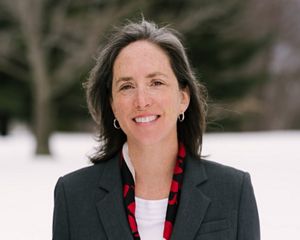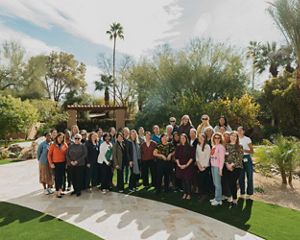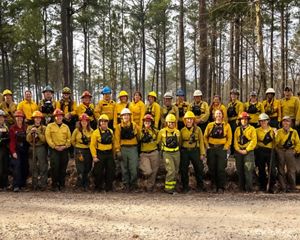The Women Behind Conservation
On the ground and in the office, these are some of the inspiring women driving our science-based conservation in Massachusetts.
As an organization, The Nature Conservancy continually reflects on the composition of our teams to ensure that a wide range of perspectives are informing our science, policy and conservation work, not just in Massachusetts, but around the world. At TNC in Massachusetts, we’re lucky to have so many women leading and contributing to our efforts. From the Berkshires to the Atlantic coast, they are on-the-ground and in the office, surveying species and landscapes, analyzing data, advocating for smart policy, leveraging partnerships and building connections to support people and nature into the future. Meet some of the women who are getting us to our 2030 goals and beyond.


Quote: Alison Bowden
We need everyone’s creativity and talents—working across science, engineering, social science and policy—to solve the greatest challenges for people and nature.
Alison Bowden: Director of Conservation Science and Strategy
I grew up on the Ten Mile River in East Providence, Rhode Island, a few miles from the birthplace of the Industrial Revolution in the United States. In the 1980s, the Ten Mile was named one of the most polluted rivers in America by the EPA, impacted by two centuries of damming, diversion and dumping of industrial wastes. The links between environmental health and human health and safety have been clear to me since I was very young. I got degrees in environmental science and water resource management to learn how to use science to make things better for people and nature.
I’ve worked at TNC for almost 22 years. My favorite part of my job is seeing the results of big projects, like the Mill River restoration. In a 1920s report, a state biologist declared restoration of the Mill River herring run “an impossibility.” I started working on that project in 2005; the removal of three dams and construction of a fishway was completed in 2018. Today, the river herring run is growing, water quality is improving and the risk of flooding has been reduced.
Diversity within an organization or team, including gender diversity, is associated with increased productivity and creativity. We need everyone’s creativity and talents—working across science, engineering, social science and policy—to solve the greatest challenges for people and nature.


Quote: Barbara Charry
There are many types of science careers and pathways to apply science, and all are needed to support people and nature.
Barbara Charry: Director of Rivers and Lands
I’ve always loved animals. In junior high, I volunteered at a nature center in Connecticut and got to handle the animals, clean cages and even go on a trip to Cape Hatteras for birdwatching. I was hooked and realized that the way I could do the most to help animals was to protect their habitats. That passion led me to a career as a conservation biologist in Maine, where I worked for many years for Maine Audubon focusing on how development, roads and climate change impact wildlife. The Nature Conservancy was a partner I worked with frequently. When I was ready for a career change, I pursued an exciting opportunity to work for TNC in Missouri leading floodplain and nature-based solutions work. In fall 2022, I took on the role of director of rivers and lands for TNC in Massachusetts.
I love building relationships and collaborating with partners, developing pragmatic strategies and solving problems to both protect nature and help people. One of my favorite parts of my job is that I get to learn every day, whether it is about TNC’s work restoring an important habitat, the science of how flooding impacts wildlife and people, how wildlife move across land or up and down rivers, or policies and programs that support conservation work.
Science is how we learn about the world and use that knowledge to make decisions that impact our and the planet’s future. I didn’t set out to have a career in science—when I was in school there were very few women in science that I could see. I thought there was just one pathway to work in science, which didn’t feel welcoming to me. My science career developed anyway because I wanted to make a difference for wildlife. I want young women to see that there are many types of science careers and pathways to apply science, and all are needed to support people and nature.
Quote: Meg Connerton
I’m teaching my young daughter about the natural world and the importance of protecting it. With that comes the message that we all have a part in this work.

Meg Connerton: Director of Operations and Culture
Ever an idealist, I was lucky enough to spend much of my childhood outdoors and grew up with a profound send of place. After graduating with a degree in Environmental Affairs from University of New Hampshire, I thankfully made my way to TNC.
My colleagues are the best part of my job. TNC’s staff are by far, our greatest asset. I’m consistently awed by their wisdom, dedication and drive. I’m inspired to help create a supportive community, both where staff feel safe to show up authentically but also have the tools and processes in place that allow them to get their best work done easily.
I’m teaching my young daughter about the natural world and the importance of protecting it. With that comes the message that we all have a part in this work. Girls need strong role models. I hope that introducing her to smart, driven women making a real difference will empower her to do the same.
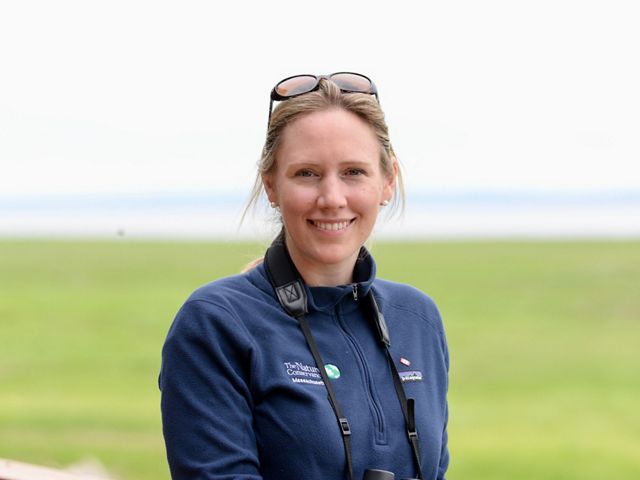
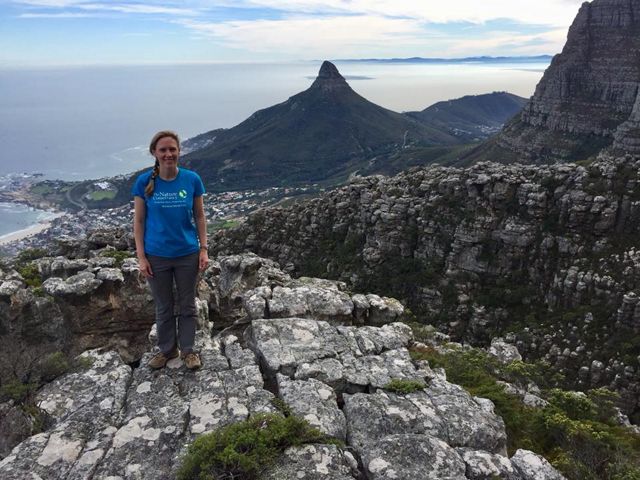
Jessica Dietrich: Geographic Information System (GIS) Manager
Since I was very young I’ve always loved being outside and exploring, and I knew I wanted to work in the environmental field. I like looking at the big picture and understanding how the elements of a landscape are connected and influence each other. I studied landscape ecology and a big part of that was learning GIS as a tool to answer questions about where to focus conservation to have the most impact.
My favorite part of my job is the variety. I love studying and analyzing data, and at the same time, I love sitting down with my colleagues and partners to strategize how best to apply these data, whether that be prioritizing where to protect a piece of land or restore a wetland, identifying critical wildlife corridors, creating maps that communicate our work to a wider audience, or measuring the impacts of an urban tree planting project. And of course, I love getting out into the field to ground truth and see the places I’ve studied and mapped from my desk.
Who we see as role models really matters. Women bring different perspectives that are relevant to understanding our world and envisioning solutions to the challenges we face. The more visible we are, the more the next generation will see they have a place as well, and be inspired to put their talents and energy to work for nature.
Quote: Jessica Dietrich
The more visible women are, the more the next generation will see they have a place as well, and be inspired to put their talents and energy to work for nature.
Loren Dowd: Marketing and Communications Content Manager
I grew up in the mountains and on the ocean in Hawai‘i, and learned from a young age to mālama ka ‘aina (care for and protect the land). This way of being was embedded into outdoor activities with my family, learning about and giving back to the land through Girl Scouts, and in school. I’ve also always wanted to be a writer. After college, I decided I wanted to use my love of writing to help encourage others to care for our planet, especially as climate change became an increasingly apparent threat to our well-being.
One of the best things about being a content writer is that I get to interact with everyone on staff, spend my time learning about the work they're doing, and then share it with our audiences to inspire hearts and change minds. It's rewarding to see firsthand the impact we're having and help educate others.
Working in science and environmental communications has taught me that if we're going to save the planet and ourselves, we need each and every one of us, especially women and other identities who have been left out of science, policy and decision-making. We all have unique skills to contribute to the enormous task of slowing climate change, adapting to impacts, and protecting nature and humans—together, we will find a way.

Karen Lombard: Director of Stewardship & Restoration
I majored in biology and environmental studies and when I learned about TNC’s work, I said to myself, “I would like to work for that organization.” I had an internship with the National Park Service in Hawai’i, which led to volunteering and then an internship at TNC, and aside from some time off, I’ve been here for nearly 25 years.
I love how the job has a lot of variety—every day is different and the job is always changing. I manage properties on the ground, oversee restoration projects, work with partner organizations and collaborate with other TNC colleagues beyond the state. It turns out that my strengths are in project management—I make things happen—and TNC provides lots of opportunities for that.
Science and nature are for us all, so it makes no sense that this field should be dominated by just 50% of the population. At least in Massachusetts, preserve management and restoration work has included women from the start and there are a lot of women in this field, which is great to be a part of.
Quote: Karen Lombard
Science and nature are for us all, so it makes no sense that this field should be dominated by just 50% of the population.
NANCY MAREK: Family Forest Outreach Specialist
I've been involved in conservation work for years and have always been interested in TNC. When a position involving forestry opened up, I jumped at the chance. I'm the family forest outreach specialist, providing technical assistance to forest owners interested in the Family Forest Carbon Program and other forest conservation programs in Massachusetts, Vermont and New Hampshire.
I love talking to landowners about forest conservation programs and helping others give back to the community. I'd encourage anyone interested in conservation work not to give up if the path is challenging or you experience failure.

Rebekah Myers: Stewardship Manager, Islands and Southeast Massachusetts
As a child, I spent a lot of my time learning about animals. I originally went to college for film and dreamed of filming nature documentaries, but had always had a proclivity toward science. I eventually went back to school to study wildlife science and gravitated toward biodiversity and nature conservation, especially during my Master's in Natural Resource Management. Throughout my academic years, I was fortunate to be involved in field research across four continents and worked extensively in Africa. Although cliché, I followed my passions and what I was good at.
I was a supporting member of TNC for many years before joining the staff and knew being a part of this work was something I could be proud of. I'm enjoying putting into practice all the formal knowledge about conservation I've gained from my academic and field research, with practical skills I've acquired through various life and work experiences. I'm motivated by successful outcomes and support, and can get behind something I believe in and understand. This field can be challenging to break into, but also very rewarding and exciting if you have the right attitude and perseverance. Stay focused, believe in yourself and the importance of your work, stay connected and network, and take risks to seize opportunities to gain experiences.
Quote: Bekah Myers
Stay focused, believe in yourself and the importance of your work, stay connected and network, and take risks to seize opportunities to gain experiences.
Leslie Pond: Volunteer and Former External Affairs Coordinator
I’m a biochemist/immunologist/cell biologist by training and have had a career in scientific publishing and managing a postdoctoral training program. After retiring, I wanted to pivot to work on urgent environmental issues such as climate change, so have been a research intern, volunteer, and part-time member of the policy and partnerships team at TNC for the last four years. I’ve created an info sheet that focuses on the nexus of climate change, health and equity, as well as a report on potential pathways to create a green infrastructure workforce development program, as part of a partnership with a Boston-area neighborhood development corporation. I’m always excited to engage with community members in climate conversations and actions.
Women have essential roles in society, and in many regions, women and girls are often differently and disproportionately impacted by environmental and climate disasters than men. It is estimated that globally, 80% of people displaced by climate change are women, and women are more likely than men to experience poverty. Women across the world are already bringing their incredible and diverse skills and perspectives to bear on environmental issues, such as climate change adaptation and mitigation. Therefore, it is so important to amplify their voices and make sure that we include women front and center at all levels and across sectors in leading the change that we need to effectively deal with the climate crisis.

Jessica Rice Healey: Senior Associate Director of Development
Growing up in Massachusetts, the New England landscape was a big part of my family’s recreation. I always knew I wanted to pursue a career working in the environmental field and have been fortunate to work for organizations leading important conservation efforts for my entire career.
Even though my degree is in environmental policy, I’ve always been on the administrative side of the work, such as executing global forestry conferences, working with dedicated event volunteers and partnering with generous donors to help fulfill their goals. This allows me to support work that is personally meaningful to me while continuing to learn from the amazing conservation experts that I work with every day.
My work at TNC has been so rewarding as I continue to enable critical conservation action in important places around the globe, as well as my home here in Massachusetts. Every day is different as a development professional—one day may include visiting with a donor at their home or going for a walk to see one of our sites and another day may include lots of planning in front of a computer or helping a colleague think about the best way to steward a new donor. Throughout my career I’ve met some incredible people and seen some beautiful places, from the forests of Brazil to those of the Berkshires.
Quote: Jessica Rice Healey
Being on the administrative side of the work allows me to support efforts that are personally meaningful to me while continuing to learn from the amazing conservation experts that I work with every day.


Angela Sirois-Pitel: Watershed Conservation Manager
I fell in love with field work when I started doing wood turtle tracking in New Hampshire right after college. I was then hired for a Student Conservation Association internship with TNC in the Berkshire Office, to do wetland restoration and help with bog turtle research. More than 15 years later, I’ve gone from that internship to running the landscape office, having gotten my masters studying bog turtles and hosted and mentored over 35 seasonal staff and interns during that time. It’s been incredible! Protecting and preserving the bog turtles and their habitat in Western Massachusetts really holds a special place in my heart—I love the blend of science, management and human components that my work offers.
I think women weren’t always welcome in these positions and were under-represented until my generation. I’m lucky to have had a lot of great women role models at TNC who have supported my career. I really value my opportunity to supervise and mentor the next generation of conservation leaders, many of whom have been women (like Julia, featured below!). It’s really important that we continue to provide opportunities for women and girls to be connected with nature and understand its benefits.
Quote: Angela Sirois-Pitel
I value my opportunity to supervise and mentor the next generation of conservation leaders, many of whom have been women. It’s really important that we provide opportunities for women and girls to be connected with nature.
Quote: Chloe Tomasetta
Chloe Tomasetta: Marketing and Communications Coordinator
I joined TNC in Massachusetts in February 2024, excited about how TNC is such a people-oriented organization. I've always been motivated by the beauty found in the natural world. I love to spend time outdoors hiking, camping, running and walking my dog; I have a deep appreciation for nature, which I think translates to my work at TNC, collaborating with like-minded individuals to uphold our mission of protecting and restoring the environment.
I got involved in environmental conservation during my college years, when I participated in the University of Massachusetts Boston's Beacon Voyages for Service Program. As part of the Environmental Service Team, I collaborated with Friends of Coastal Carolina, contributing to projects like building fencing around a farm to curb invasive species and clearing hiking trails for all to enjoy. I also worked as a communications intern with Save the Harbor/Save the Bay to support their mission to restore, protect and share Boston Harbor.
My advice to women, or anyone, starting out their career is to make meaningful connections with everyone you meet, identify the aspects of work that genuinely excite you and find ways to maintain a sense of creativity in day-to-day life.


Julia Vineyard: Stewardship Coordinator
My first job in conservation work was working with TNC in Massachusetts as an AmeriCorps member in 2018, helping with stewardship and bog turtle monitoring. I went on to work for the Florida chapter for some time, and then returned to Massachusetts and the world of bog turtles, as they were the focus of my master's thesis. Now, as the stewardship coordinator, I provide support for the entire stewardship team from office management to habitat management.
I've been fortunate to work with a number of threatened and endangered species across the eastern United States (like the bog turtle). Working to help preserve and restore both habitats and wildlife has been an incredible experience and fueled my passion for conservation. I want to do as much as I can to help the flora and fauna that also call our planet home.
If you're also interested in conservation, I would advise trying a variety of different jobs if you can. I knew I wanted to work primarily outdoors but didn't realize how many unique positions there were in this field until I began working with TNC.
Quote: Julia Vineyard
Working to help preserve and restore both habitats and wildlife has been an incredible experience and fueled my passion for conservation. I knew I wanted to work primarily outdoors but didn't realize how many unique positions there were in this field until I began working with TNC.
Keep up with their work!
Sign up for updates on the work these amazing women and all our staff are doing.






